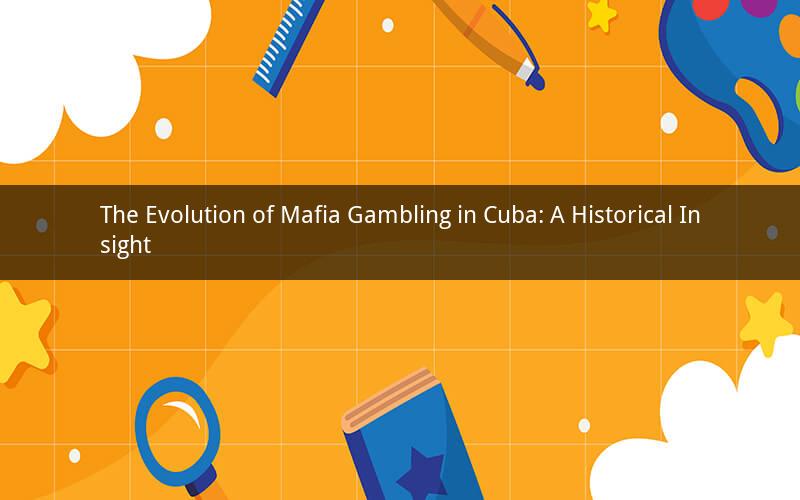
Introduction:
The history of mafia gambling in Cuba is a fascinating journey that intertwines with the political and social landscape of the island. From the early days of Prohibition to the rise of organized crime, the Mafia's influence on Cuban gambling has shaped the nation's cultural identity. This article delves into the origins of mafia gambling in Cuba, exploring the factors that contributed to its growth and the impact it had on the island.
1. The Rise of Prohibition and the Birth of the Mob:
Prohibition, enacted in 1920, had a significant impact on the United States and its territories, including Cuba. The ban on alcohol led to a surge in illegal drinking establishments, known as speakeasies, and an increase in demand for bootlegged alcohol. This created a perfect opportunity for organized crime syndicates, including the Mafia, to enter the market.
In Cuba, the Mafia quickly capitalized on the lucrative opportunity presented by Prohibition. With the support of influential political figures and corrupt officials, the mob established a strong presence in the nation's capital, Havana. The city became a hub for bootlegging operations, and the Mafia's involvement in gambling began to flourish.
2. The Mob's Influence on Cuban Gambling:
The Mafia's entry into the gambling industry in Cuba was marked by their ruthless and efficient approach. They quickly gained control over the most profitable gambling establishments, including casinos, race tracks, and sports betting. The mob's influence extended beyond the gambling industry, as they used their power to intimidate competitors and corrupt officials.
One of the key figures in the Mafia's rise to prominence in Cuba was Meyer Lansky, known as the "Mob's Brain." Lansky's strategic mind and ability to adapt to changing circumstances allowed him to establish a formidable criminal empire. He partnered with local Cuban entrepreneurs and political figures to ensure the mob's control over the gambling industry.
3. The Impact of Mafia Gambling on Cuban Society:
The presence of the Mafia in Cuba's gambling industry had a profound impact on the nation's society. While the mob brought significant wealth and prosperity to the island, they also introduced a culture of violence, corruption, and greed. The Mafia's influence led to an increase in organized crime, drug trafficking, and political corruption.
Despite the negative consequences, the Mafia's gambling operations also brought employment opportunities and economic growth to Cuba. The influx of tourists and money from the gambling industry helped to stimulate the local economy. However, the long-term effects of the Mafia's presence on Cuban society were detrimental, leading to a cycle of violence and corruption that persisted for decades.
4. The End of the Mafia's Dominance:
The decline of the Mafia's influence in Cuba began in the 1950s, as the political climate in the United States and Cuba changed. The Cuban Revolution, led by Fidel Castro, aimed to dismantle the corrupt system that had been in place for decades. The revolutionaries sought to eliminate the Mafia's control over the gambling industry and other sectors of the economy.
As a result, the Mafia's power in Cuba diminished, and many of its members were either imprisoned or forced to flee the island. The end of the Mafia's dominance in Cuban gambling marked a new era for the nation, as it sought to rebuild and move forward from the legacy of organized crime.
Conclusion:
The history of mafia gambling in Cuba is a complex and intriguing chapter in the island's past. From the rise of Prohibition to the fall of the Mafia's influence, the story of Cuban gambling reveals the intertwining of politics, crime, and culture. Understanding this history is crucial for appreciating the impact of organized crime on Cuban society and the nation's ongoing struggle to overcome its legacy.
Questions and Answers:
1. Q: How did the Mafia gain control over the gambling industry in Cuba during Prohibition?
A: The Mafia gained control over the gambling industry in Cuba by leveraging their connections with corrupt officials and political figures. They established partnerships with local entrepreneurs and used intimidation and violence to eliminate competitors.
2. Q: What was the role of Meyer Lansky in the Mafia's rise to prominence in Cuba?
A: Meyer Lansky was a key figure in the Mafia's rise to prominence in Cuba. His strategic mind and ability to adapt allowed him to establish a formidable criminal empire, including control over the gambling industry.
3. Q: How did the Mafia's presence in Cuban gambling impact the nation's society?
A: The Mafia's presence in Cuban gambling introduced a culture of violence, corruption, and greed. While it brought economic growth, it also led to an increase in organized crime, drug trafficking, and political corruption.
4. Q: What factors contributed to the decline of the Mafia's influence in Cuba?
A: The decline of the Mafia's influence in Cuba was primarily due to the Cuban Revolution, which aimed to dismantle the corrupt system. The revolutionaries sought to eliminate the Mafia's control over the gambling industry and other sectors of the economy.
5. Q: How did the end of the Mafia's dominance in Cuban gambling affect the nation's future?
A: The end of the Mafia's dominance in Cuban gambling marked a new era for Cuba. It allowed the nation to rebuild and move forward from the legacy of organized crime, though the long-term effects of the Mafia's presence on Cuban society continue to be felt.